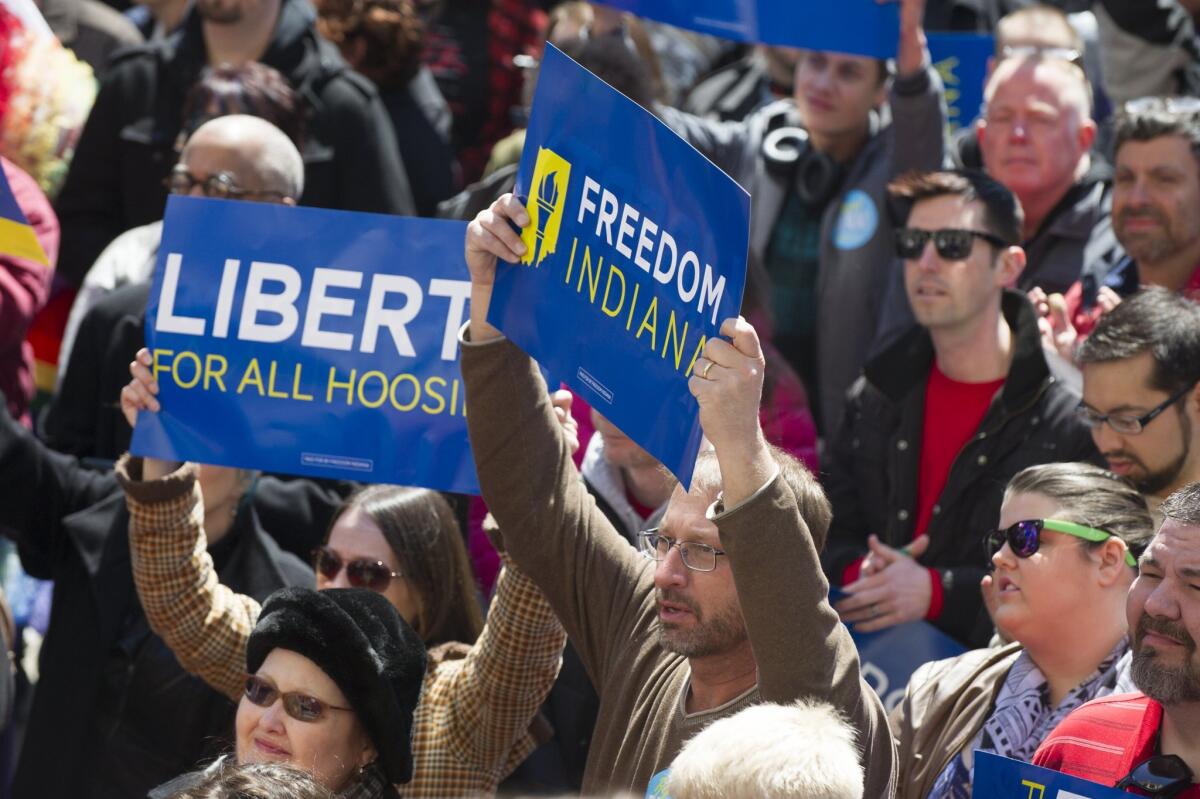Op-Ed: Indiana law shows LGBT people the closet door

- Share via
In a private ceremony Thursday, Indiana Gov. Mike Pence signed into law Senate Enrolled Act 101, the innocuous sounding Religious Freedom Restoration Act. It prevents state and local governments from enacting laws that would “substantially burden” a person’s exercise of his or her religion. Moreover, SEA 101’s definition of a “person” includes “a partnership, a limited liability company, a corporation, a company, a firm, a society, a joint-stock company, an unincorporated association, or another entity” that claims its practices are compelled or limited by a religious belief. In simpler terms, if a business says its services are tied to its owners’ faith, it can turn away customers who don’t adhere to its religious views. The obvious intention of the bill, given recent advances in LGBT civil rights, is to permit discrimination against gays and lesbians.
Supporters of this bill and others like it dismiss the possibility of discrimination as no big deal. Buy your wedding cake from another bakery, they say to gay couples. Or, there are plenty of other banquet halls that will host your reception. But imagine, for a moment, what it would feel like to be gay, lesbian or transgender in Indiana, not knowing when you entered a business whether you would be asked to leave. I know this anxiety, having experienced it myself.
In the early 1990s, when my partner (now my husband) and I were first a couple, we took a lot of road trips, often through rural areas in the South and Midwest. When it came time to stop for the night, we usually had few if any options — a budget motel somewhere. We almost never checked in together, even though we paid for two guests. One of us would wait in the darkened car while the other registered, and once we had the key we would enter through a side entrance, if we could. It was degrading and probably unnecessary 95% of the time. But rather than risk the 5% chance that we’d be hassled, we did it.
Perhaps most couples and families, gay or not, send just one person in to check on a room. Try to understand the difference: This was out of fear on our part. Not a crushing fear, but a genuine concern that we would be turned away, insulted or worse. We didn’t want an awkward pause, a stare or a lecture, we wanted a room.
What we went through on those road trips two decades ago may well become routine for gay citizens in small-town Indiana. Simple, everyday acts like getting a prescription filled, sending flowers to surprise a loved one at work, or going out to eat will be laden with apprehension.
In 2003, the U.S. Supreme Court overturned a Texas statute banning consensual same-sex sexual activity in the case known as Lawrence vs. Texas. At the time it was killed, the law was rarely enforced. (Years earlier, it certainly was.) Still, it forced people to look over their shoulders. Similarly, Indiana’s new statute may lead gay citizens to second-guess every public interaction, not because most businesses will treat them differently, but because they could, without legal repercussion.
Like many in the LGBT community, I’m too far out of the closet to deal with side entrances anymore. Though I live 20 miles from the Indiana border and have visited often — I spent my college years there — I don’t expect to be checking in to any of that state’s hotels in the near future, and this law is why. I can make it to Michigan without stopping for gas. The beaches and bike trails are beautiful there, too.
Granted, my own state, Illinois, has a law comparable to SEA 101 already in place. But it contains no language extending religious exemptions to businesses; and, unlike Indiana, Illinois has a statute on the books specifically prohibiting discrimination based on sexual orientation or gender identity.
When this “religious freedom” law goes into effect July 1, I suspect that some Indiana LGBT couples will accept separate checks at restaurants as if they’re co-workers. Some will sneak into motel rooms like they’re having an affair or sign apartment leases as if they were roommates. And some will wonder if they’d be better off someplace else.
Jerome Pohlen is an editor and author who lives in Chicago. His next book, “Gay and Lesbian History for Kids,” will be released in October.
Follow the Opinion section on Twitter @latimesopinion and Facebook
More to Read
Sign up for Essential California
The most important California stories and recommendations in your inbox every morning.
You may occasionally receive promotional content from the Los Angeles Times.













